Recent Comments
Prev 453 454 455 456 457 458 459 460 461 462 463 464 465 466 467 468 Next
Comments 23001 to 23050:
-
John Hartz at 07:44 AM on 30 August 20161934 - hottest year on record
DarkMath:
In comment #53, you state:
I don't have any skin in the game here. I have a strong science background but only deal with medical data all day long.
In comment #54, you state:
If I've learned one thing in my engineering career it's always go with the simplest option first.
Does your "engineering career" include dealing with medical data all day long?
-
DarkMath at 06:34 AM on 30 August 20161934 - hottest year on record
michael sweet: "without adjusting for differrences in number of sites, location of sites or time of day of measurements"
There are many different ways to clean up data. For example adjusting for changes in the time of day. Say a weather stations data from 1900 - 1950 was taken at 12:00pm and from 1950 - 2000 it was taken at 1:00pm.
NASA/NOAA's approach to clean the data is by far the most complicated. It didn't have to be. You could start out in this case without making any adjustments at all. You simply treat them as two separate data sets. Voila. All that matters is that weather stations change in recorded temperature at a specific time. You reduce it to a rate of change, one set for the 12:00pm and another for 1:00pm. It no longer matters what time the temperature was taken because using 2 datasets instead of one removes time of measurement as a variable. The same would hold true for an elevation change or change in location.
NASA/NOAA didn't even attempt this simple option. Instead they went with some hefty calculations to make that one stations 100 years of data appear if it was all taken at the same time, the same location and same elevation. That's great, it's worth doing but shucks that is a lot of work. If anything the much simpler "treat a change in time/elevation/location" as if it were another weather station technique could be used to validate the more complicated approach. If I've learned one thing in my engineering career it's always go with the simplest option first.
Moderator Response:[PS] This is getting offtopic here. Please post any responses to Darkmath about how the temperature record is adjusted to "Temp record is unreliable".
Darkmath - put any further responses you wish to make over adjustment there too please.
[TD] Darkmath, read the Advanced tabbed pane on that thread before commenting there. You also must actually read Tom Curtis's response to you, in which he already explained the BEST team's approach of not making any adjustments. Then you must respond to his comment explicitly (on the thread that moderator PS has pointed you to). I write "must," because SkS comments are for discussion, not sloganeering. "Sloganeering" includes failing to engage with respondents substantively.
[JH] I flagged DarkMarth for sloganeering upstream on post #48. I also advised him to read the SkS Comments Policy and to adhere to it.
-
Dcrickett at 02:36 AM on 30 August 2016California has urged President Obama and Congress to tax carbon pollution
“You can lead a horse to water…” may apply to the US Congress, neither of whose houses is of good repute these days. (Here in Illinois, our legislature is the stuff of which legends are made.) Nevertheless, climate action is a matter of global concern; serious action at state and local levels offers minimal benefits and possible serious economic drawbacks.
The US, as a major economic power, can impose a Carbon Tax along with tariffs on imports and rebates on carbon fees paid, to nullify any advantage non-taxing foreign economic entities might have by avoiding an equivalent Carbon Tax. Even better, the tariffs paid on imports from such entities would accrue to the coffers of the US treasury, with nothing going to the non-taxing (or under-taxing) foreign governments. There is wisdom in the slogan “Carbon Taxation in One Country,” a paraphrase of the slogan associated with Iosif Dzhugashvili, altho in this case with an international intent more commonly associated with Lev Bronstein.
The US Congress can impose such a tax, together with the corresponding tariffs and rebates. However, no individual State among these United States can so do.
We Americans should do all we can to get our Congress to do so. No other country has the global economic power to do so, save perhaps China.
-
DarkMath at 00:17 AM on 30 August 20161934 - hottest year on record
Tom Curtis, you have valid points about why the temperature needs to be adjusted and/or estimated. But the problem is those adjustments and estimates change over time:
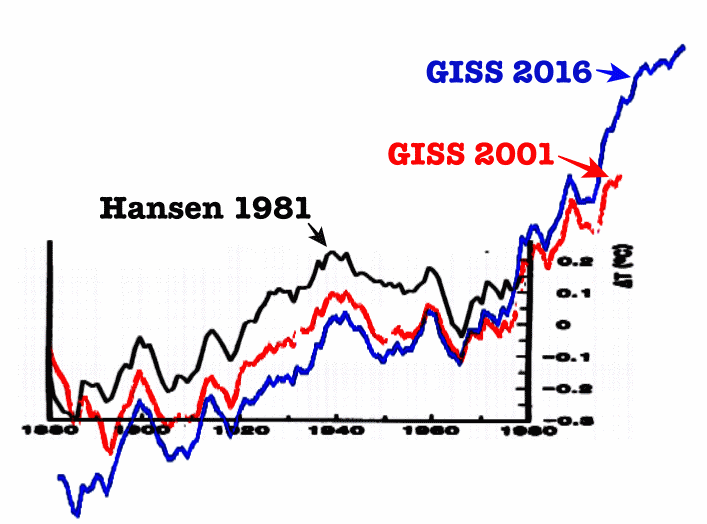
The more the temperature record changes the less confidence I have in it.
Then there is the discrepency between NASA's land and satellite temperature data. They don't always match up. For example here:
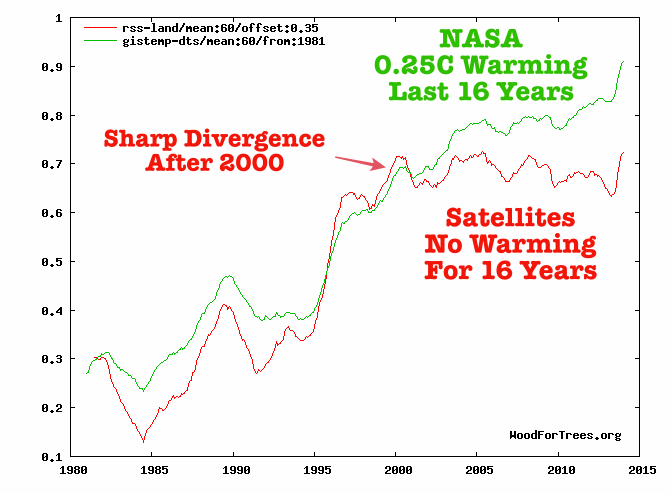
I don't have any skin in the game here. I have a strong science background but only deal with medical data all day long. I'm an objective observer of climate science. But I got to tell you though is the more I read the more I think the science definitely doesn't appear "settled". And given I've become an expert in observing human scientific endeavor over the past 30 years, :-), I always expect the worst.
Moderator Response:[TD] All the adjustments, both procedures and individual raw and adjusted data, are publicly available--along with the rationales for the repeatedly improved adjustment methods. You are welcome to state on SkS your specific objections to any of those procedures, rationales, or data. But you are not welcome to simply state, without referring to any of that evidence, that you just don't trust the adjustments, because that implies that you don't trust the scientists no matter how publicly and thoroughly they document their work, which implies that you are unwilling to discuss evidence. The SkS comments are for evidence-based discussions. All that I've just told you to address, must appear in the thread that moderator PS pointed you to, not this thread.
Regarding satellite measurements of temperature, read the post "Which is a more reliable measure of global temperature: thermometers or satellites?" Comment further on that topic on that thread, not this one. I strongly suggest that before commenting there you also read the post "Satellite measurements of warming in the troposphere"--all three tabbed panes, but especially the Advanced one. You should hesitate to assume the satellite temperature indices are superior to surface and balloon indices especially because those satellite indices started to diverge from both surface and balloon indices around the year 2000 when the satellite instruments were switched.
[RH] Please limit images to 500px.
-
Glenn Tamblyn at 18:52 PM on 29 August 20162016 SkS Weekly News Roundup #35
chriskoz
The Uni Bremen chart shows concentration differences across the pack more clearly than the NSIDC chart HK showed:
More interestingly, although it is more work, is to have followed the evolution of the ice pack over the season through direct imagery from Lance-MODIS. Major cracking events north of the Canadian Archipelago and often close to the Pole, lots of broken up floes across not just the peripheral seas but into the Central arctic basin on and off again over months. They move apart slightly, compact, refreeze together a bit. If 3-4 meter thick multi-year ice breaks up into flows that refreeze, the 'joints' are thinner, weaker. You can often see this in the Lance-Modis images.They are all indications of an ice pack that has less structural integrity. So concentrations maps such as above are an end of season consequence of a far more broken up ice pack. And a series of strong storms in the last few weeks has also contributed.
So by poor I mean mechanical integrity.
As to thickness, PIOMAS only updates every month. DMI update there volume product almost daily and it is suggesting a significant drop over August. There are some concerns that the model DMI uses isn't as robust as PIOMAS but still it is probably useful as indicative of relative changes until PIOMAS updates. And we all wish Cryosat 2 was operational during the melting season :-(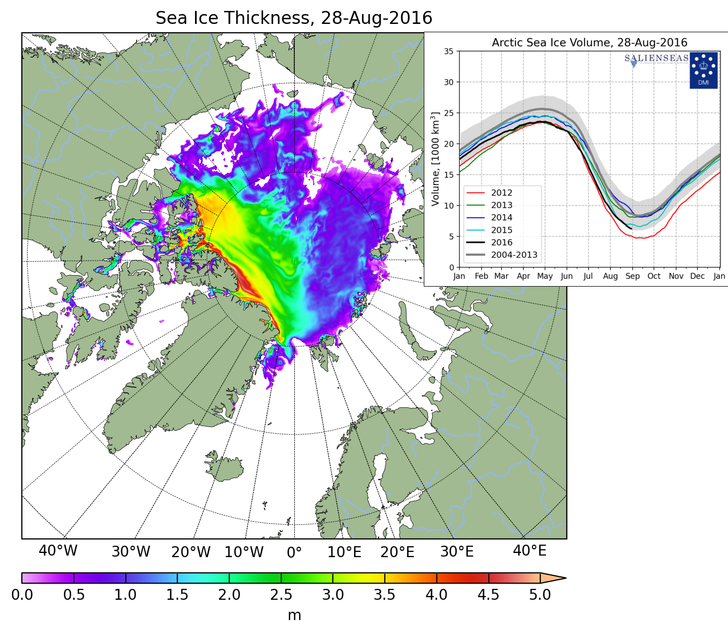
If you haven't been there Neven's Arctic Sea Ice Blog is good value. His graphs page here links to all sorts of sources. Check out the Regional Graphs pages for basin level graphs produced by one of his regular users, Wipnius, from raw satellite feeds. Then visit his forum. Lots of knowledgeable people who live and breath the arctic.
-
2016 SkS Weekly News Roundup #35
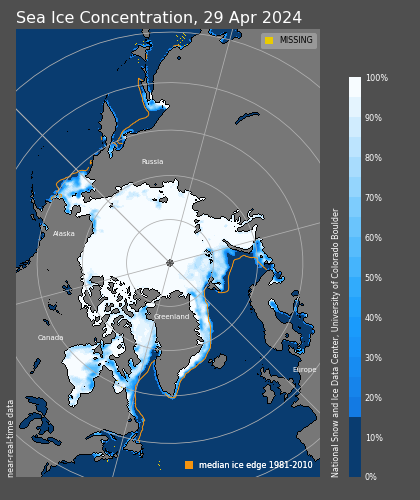 Chriskoz:
Chriskoz:
Glenn is probably referring to this chart of the sea ice concentration. Note the large regions on the Siberian side with less than 50% concentration. With some care I guess it would be possible to maneuver a small boat between the ice floes in much of that region. After this coming winter, the so-called multiyear ice will contain lots of thin first year ice. -
One Planet Only Forever at 14:22 PM on 29 August 20162016 SkS Weekly News Roundup #35
I have noticed that in the NSIDC records for Arctic Ice Extent (Charctic Interactive Sea Ice Graph) the fluctuation of extent appears to be noticeable lower one or two years after significant El Nino events (using the NOAA ONI values to identify significant El Nino events).
- 1999 and 2000 had significantly lower extents than 1998
- 1984 and 1985 had significantly lower extents than 1983
- 1990 and 1991 had significantly lower extents than 1987/88 (the warm ONI values started in 1986 and continued through 1988)
- 1993 and 1995 had significantly lower extents than 1992
- 2005 had a significantly lower extent than 2003
- 2012 had a significantly lower extent than 2010
If there is a reason for the minimums to drop in the years immediately following an El Nino then 2017 or 1018 would likely be a minimum that is clearly lower than 2012.
-
chriskoz at 13:33 PM on 29 August 20162016 SkS Weekly News Roundup #35
Glenn@3,
The state of much of the ice pack up thre is very poor, with near record low concentrations over 1/2 the Arctic
We'll have more data as the melting season concludes soon but I want to know the emerging picture now. Your statement is very vague. What do you mean by "very poor"? By PIOMAS metric (click to see the original), the ice volume runs quite low but higher than 2011, 2013 and of course 2012.
-
Glenn Tamblyn at 12:17 PM on 29 August 20162016 SkS Weekly News Roundup #35
Further to Victor's link.
Arctic sea ice this year may challenge the 2012 record as far as area at minimum goes. It won't challenge the 2012 extent record, although it may come 2nd. The state of much of the ice pack up thre is very poor, with near record low concentrations over 1/2 the Arctic. And a lot of multi-years ice has been lost this year. Ice often flows down the east coast of Greenland, through Fram strait. This year not much. Not because the ice isn't moving there, it is, but the high North Atlantic is so warm this year the ice melts when it hits that region rather than being able to drift south. This has been clear on satellite images for a couple of months.
That said, there is still a lot of ice left, the situation is really only getting back to near the 2012 state after several colder years. With the likely state of the ice at the end of this melt season in about 3 weeks, the ice is quite possibly set up for bigger melt next year if the right weather conditions prevail. However, there is still a lot of ice to work through before the Arctic can become ice free, particularly completely ice free.
Most people use an operational definition of 'ice free' as below 1 million km2. Currently it is around 3.5 million km2 in area and 5 million km2 in extent.
Could several years of weather conducive to melt lead to reaching the 1 million threshold? Possibly. But if they are poorer weather years, it could expand again. The longer term trend seems clear but how far off is quite variable. 2 years, almost certainly not. 50 years, also almost certainly not. But whether operationally ice free is 5 years away or 15 is quite unclear. -
Tom Curtis at 12:14 PM on 29 August 20161934 - hottest year on record
DarkMath @48, if you don't like NOAA, you can always use the AGW denier funded Berkeley Earth Surface Temperature project results:

Technically, the BEST data series make no adjustments. Instead, when there is a known, or reasonably inferred change of equipment, location, or time of observations they treat the data as coming from two distinct stations - a proceedure which Anthony Watts endorsed as having his full confidence (until he saw the results). It is certainly a proceedure that has the full confidence of Judith Curry (denier enabler), Richard Muller (temperature series skeptic), Zeke Hausfather (luke warmer) and Steven Mosher (Luke Warmer), not to mention three independent scientists selected by at the time, climate skeptic Richard Muller.
For the record, the highest ranked running 12 month mean temperature in the 1930s according to BEST ranks 23rd. In contrast, eight of the 12 highest ranked 12 month running mean temperatures are in 2012, with another three in the last three months of 2011.
But you want to cherry pick just July temperatures. However, the highest ranked July temperature in the 1930s is 1936 (ranked 3rd) followed by 1934 (ranked 6th). In contrast, in the 21st century the highest ranked are 2012 (1st), 2006 (2nd), 2011 (4th), and 2002 (5th). The average July temperature across the 1930s was 0.66 C. Across the 21st century (to 2012) it was 0.85 C.
And if you are wondering, BEST uses approximately 8 times as many stations as does the USHCN, with an increasing number in time over the 20th and 21st century.
In short, your cherry pick of the cherry pick still does not give you the conclusion you desire.
Your only refuge is to insist that when a station changes its instrument entirely, or its time of day for observations, or is moved to a new location, it should be treated as the same station with no adjustments for differences in recorded temperature between the new and the old; and to take meaningless arithmetic means that do not care that the station density in New York is far higher than that in Nevada, thereby giving more importance to North Eastern state temperatures than to those in the mid-west or west:

Your bias in favour of rich, Democratic eastern states is noted.
-
Glenn Tamblyn at 12:01 PM on 29 August 2016Historical documents reveal Arctic sea ice is disappearing at record speed
Curiouspa
Rutgers Snow lab also has data on NH snow cover.
Here is changes in Spring snow cover: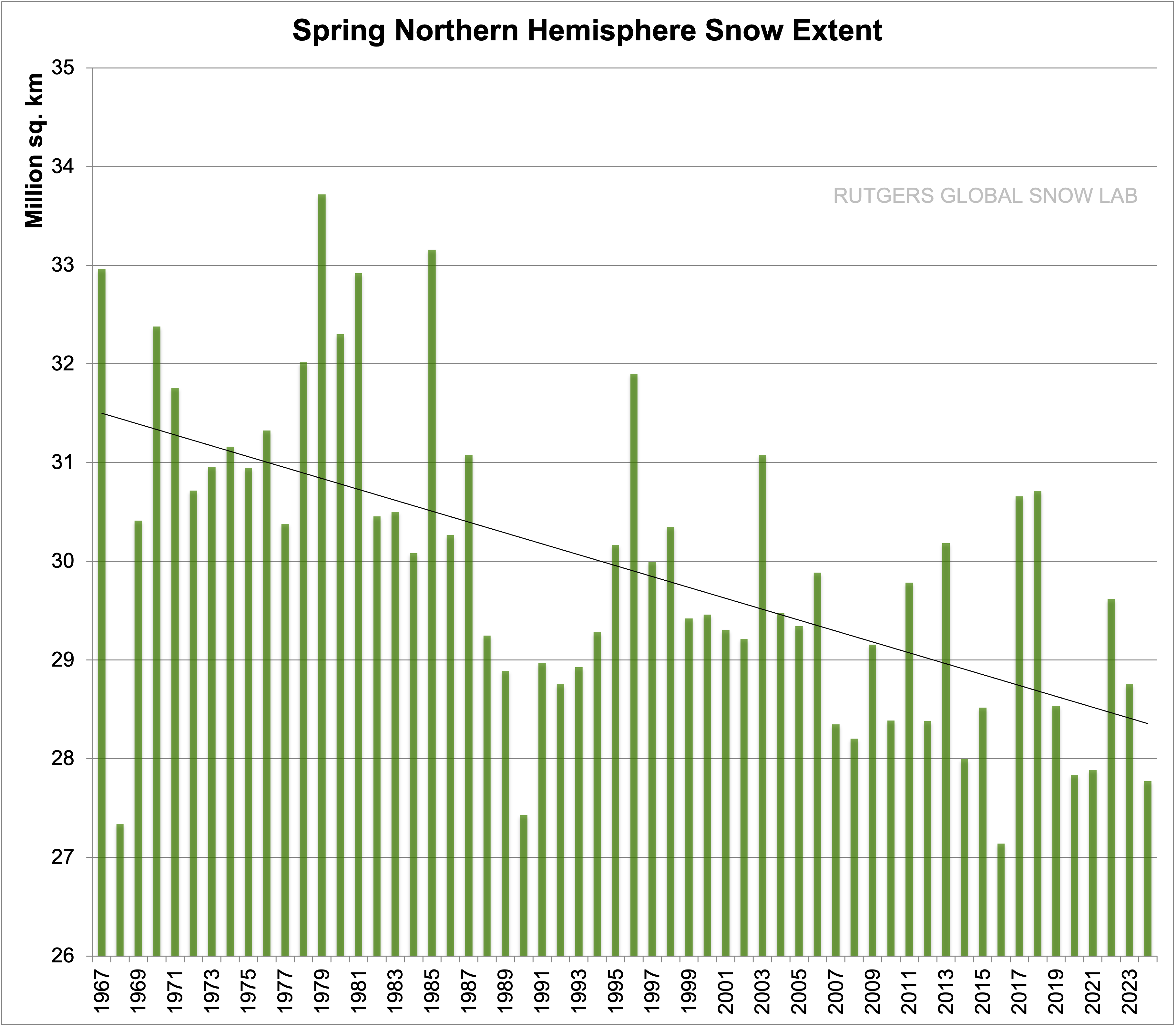
Winter:
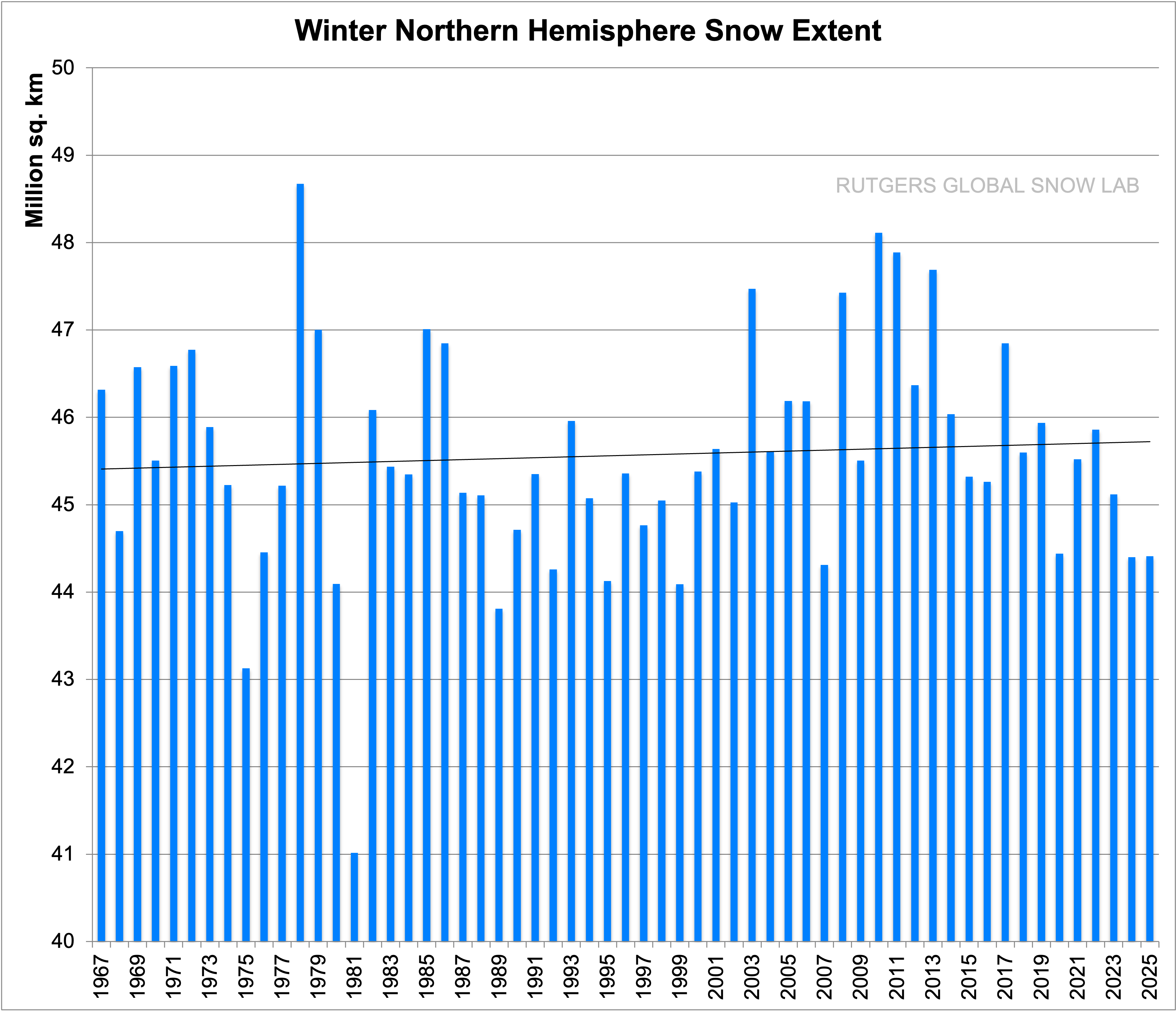
and Fall:
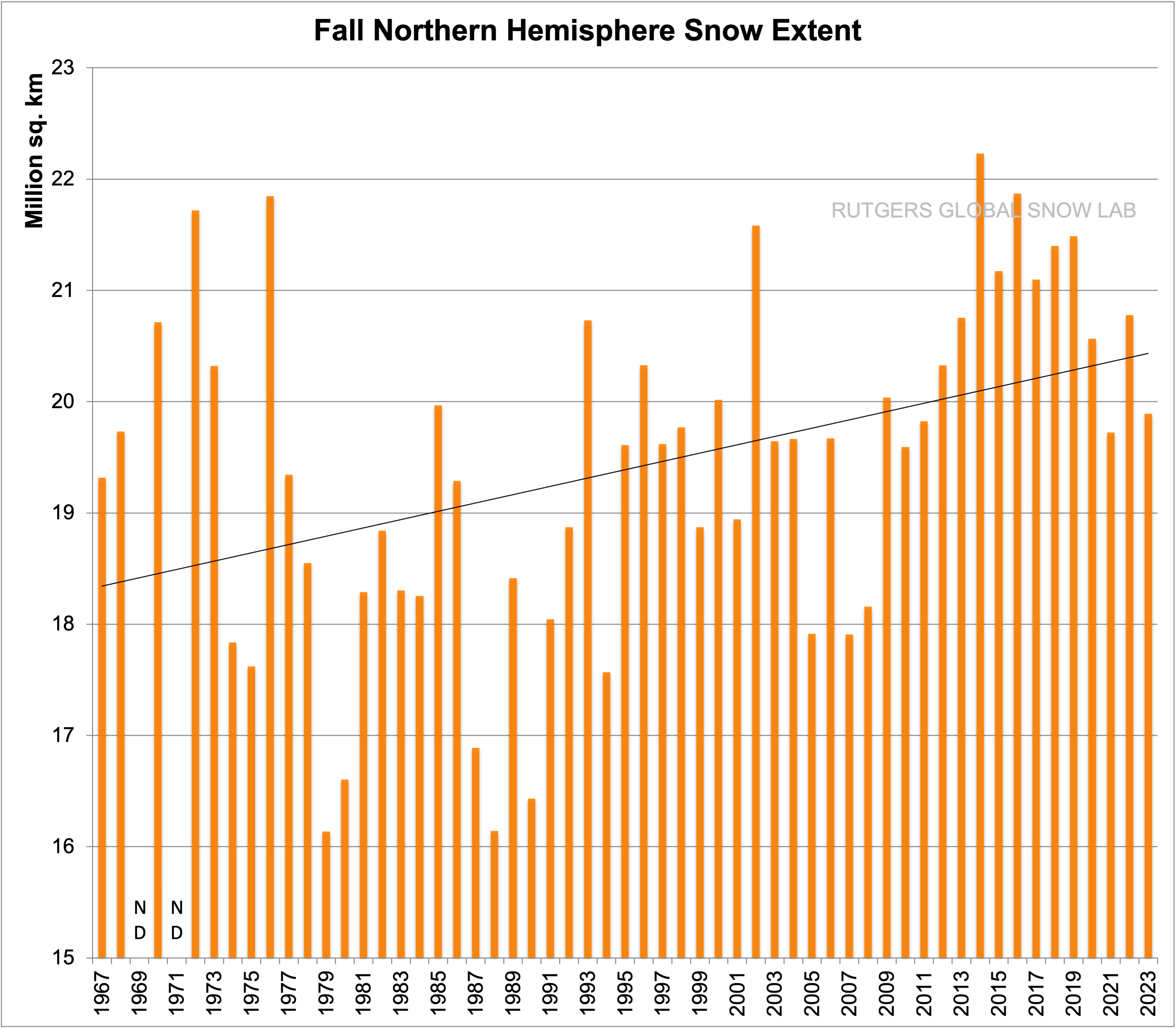
-
michael sweet at 09:53 AM on 29 August 20161934 - hottest year on record
Darkmath,
Did you really post an average temerature of the USA that simply averages all temperatures without adjusting for differrences in number of sites, location of sites or time of day of measurements? If you really think that is acceptable data you are welcome to think whatever you want. Real scientists don't agree and you will convince no-one here that you make sense.
Your suggestion that the world wide "climate model" has warming built into it is completely false (in addition to being sloganeering). The adjustments to the early ocean temperatures substaintially raise those temperatures so that the slope of the line is lowered. see this SkS article.
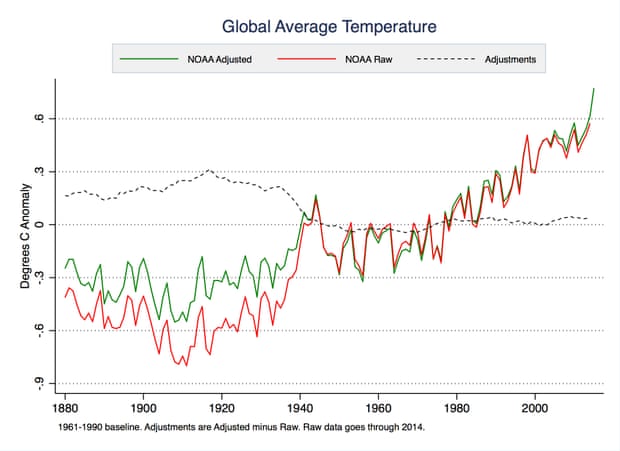
The denier websites you have frequented have mislead you. If scientists models currently raise temperatures why would they lower the slope with their early adjustments? Your argument is contradicted by the data.
-
scaddenp at 08:04 AM on 29 August 2016Global warming is melting the Greenland Ice Sheet, fast
Good point GB. 1mm of sealevel rise is 362Gt of meltwater. Melting ice contributes 52% to sealevel rise in recent time (thermal expansion is the other big contributor at 38%).
-
Gingerbaker at 05:18 AM on 29 August 2016Global warming is melting the Greenland Ice Sheet, fast
"Fast"
Unfortunately, this article gives no perspective on relative spped of ice loss. 270 gigatons may well equal 110 million Olympic pools worth of water.
But this is meaningless without knowing how many gigatons remain, when they will be depleted, and how all this relates to world-wide sea level rise.
-
Jim Eager at 03:18 AM on 29 August 2016Historical documents reveal Arctic sea ice is disappearing at record speed
Curiouspa, I suggest you look at the plot more carefully. The March plot (maximum extent) is clearly changing (declining), though not nearly so sharply as the September plot (minimum exyent).
As to why Sptember is more critical than March, the September minimum extent comes after the summer period of maximum solar incidence, while the March maximum extent comes after total or near total darkness. Which do you think will have the greater impact on energy gain?
-
MA Rodger at 02:10 AM on 29 August 20161934 - hottest year on record
http://www.skepticalscience.com/comments_policy.shtmlDarkMath,
You may come to SkepticalScience and debate the science but be aware that if you are going to pronounce "But that's not science. ;-)" it is actually beholden on you to properly explain what the "that" is which you are asserting "is not science." Otherwise "That (ie your comment) is not (real) science." Do not be deceived by the names that deluded climate deniers like Steve Goddard/Tony Heller pick to name their websites.
Moderator Response:[JH] I have flagged the sentence you cite as sloganeering and have advised Dark Math to read and adhere to the SkS Comments Policy.
-
1934 - hottest year on record
DarkMath - "Of course you're going to see a warming trend of late if you base your temperature estimates on a climate model that has warming built into it." represents either an accusation that climate scientists are idiots, or is a conspiracy theory. Neither is justified.
As Tom pointed out, summer only temperatures, let alone a focus on only a few percent of the Earth's surface area, are significant cherry-picks, and those choices on your part don't support your argument. The climate is considerably warmer now than it was in the 1930s.
-
Joel_Huberman at 00:13 AM on 29 August 2016Report Shows Whopping $8.8 Trillion Climate Tab Being Left for Next Generation
I have a quibble with the headline--not only the headline of this article but those of most articles in the media about economic forecasts. Economic forecasts are always based on so many assumptions that they would, I suspect, make climate modelers shudder (at least climate models incorporate some solid physics and chemistry). Due to these assumptions, economic forecasts can never "show" anything. At best they can estimate. Changing the word "shows" in the title to "estimates" would be much more honest!
-
DarkMath at 23:48 PM on 28 August 20161934 - hottest year on record
Tom Curtis, you're referencing NASA/NOAA land temperature data that has been adjusted or even estimated in the case of weather stations that no longer exist.
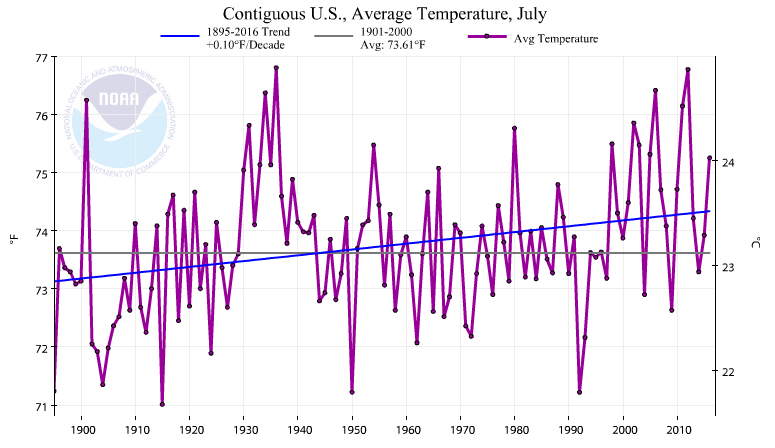
When you take out the adjustments and estimates 2012 is no longer the hotest July on record:
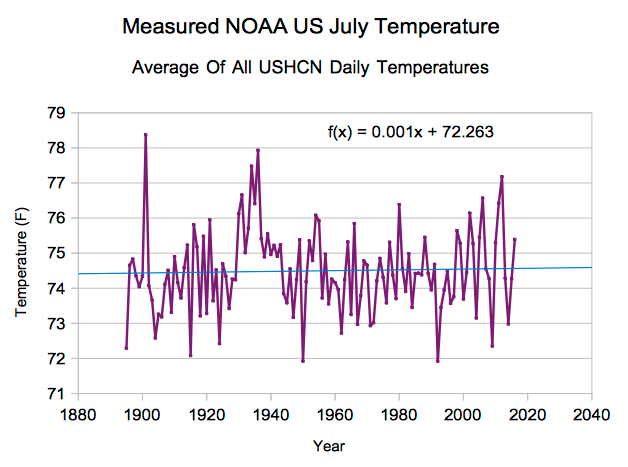
Of course you're going to see a warming trend of late if you base your temperature estimates on a climate model that has warming built into it.
But that's not science. ;-)
Moderator Response:[JH] The last two paragraphs constitute sloganeering which is prohibited by the SkS Comments Policy.
Please note that posting comments here at SkS is a privilege, not a right. This privilege can be rescinded if the posting individual treats adherence to the Comments Policy as optional, rather than the mandatory condition of participating in this online forum.
Please take the time to review the policy and ensure future comments are in full compliance with it. Thanks for your understanding and compliance in this matter.
[PS] This post also promulgates the idea that temperature record is adjusted for some nefarious purpose (effectively an accusation of fraud). If you think the record can be represented better, then please discuss here supporting your case with data and preferrably peer-reviewed publications but spare us the wild fantasies of Heller et al. If you honestly believe that you can usefully compare data from site before and after fitting say a Stevenson screen, without adjustment, then this is not the site for you.
-
curiouspa at 23:06 PM on 28 August 2016Historical documents reveal Arctic sea ice is disappearing at record speed
Thank you for the link, Bob. It seems the data is less for winter snow cover. But, there is at least one graph showing a downward trend.
-
Tom Curtis at 15:54 PM on 28 August 20161934 - hottest year on record
DarkMath @45, the highest values in the US Heatwave Index are found in (in decreasing order of intensity) 1936, 1934, 1931 and 1930, with the values of 1936 and 1934 in particular, being significantly greater than any other including recent years:

(Source)
Further, 1936 still holds the record for the percentage of area of the contiguous USA with an unusually hot summer, followed closely by 2012 and 1934:

(Source)
But a greater percentage of the contiguous USA had an unusually cold winter in 1936 than had an unusually warm summer. Indeed, 1936 recorded the second highest percentage of area with a cold winter in the contiguous USA on record:

(Source)
The combination of cold winters with hot summers resulted in 1936 only being the 49th warmest year, and 1934 (whose winters were warmer) being the 5th warmest year in the contiguous USA. In general, recent years have been significantly warmer than the 1930s:

(Source)
There is a reason for the combination of warm summers and cold winters in the 1930s:
"Poor land use practices and many years of intense drought contributed to these heat waves by depleting soil moisture and reducing the moderating effects of evaporation."
Low soil moisture also allows unusually cold nights and winters, which moderated mean temperatures in the 1930s back below typical 21st century temperatures in most years. In contrast, global warming warms nights faster (although the effect is slight) and winters faster than summer (which effect is not slight) so that modern US annually averaged temperatures are greater than those of the 1930s.
So, were the 1930s more uncomfortable to live in than the 21st century in the contiguous USA? Undoubtedly, the combination of drought, cold winters, hot summers and dust bowl made those years hellish - but the cause of the hot summers was also the cause of unusually cold winters. Are typical (record) annually averaged tempertures in the contiguous USA of the 21st century warmer than typical (record) years in the 1930s? Again, undoubtedly yes. Citing the the first fact does not change the second. Rather, it is a piece of misdirection. It is also a piece of misdirection in that the dust bowl and accompanying heat waves were largely anthropogenic (through poor farming practices). The 1930s contiguous USA is not an example of natural variability.
And all of this leaves untouched the fundamental point that concentrating on the contiguous USA rather than global temperatures is a cherry pick of mammoth proportions.
-
Tom Dayton at 11:50 AM on 28 August 20161934 - hottest year on record
DarkMath, why the heck is only the U.S. "the" issue? It's only 2% of the freakin' globe. But at least for the contiguous 48 states, you are incorrect anyway according to NOAA.
-
DarkMath at 11:20 AM on 28 August 20161934 - hottest year on record
The issue isn't how hot the U.S. was in the 1930s compared to other parts of the world. The issue is how hot U.S. temperatures NOW compared to the 1930s: https://www.youtube.com/watch?v=Gh-DNNIUjKU&feature=youtu.be&t=808
During the 1930’s, more than 70% of the US reached 100F every year, but now less than 30% of the US typically reaches 100F: http://realclimatescience.com/2016/07/record-breaking-heatwave-in-the-us/
-
VictorVenema at 07:01 AM on 28 August 20162016 SkS Weekly News Roundup #35
`Next year or the year after, the Arctic will be free of ice’ by Robin McKie, Observer/Guardian, Aug 21, 2016
FYI, climate scientists (Climate Feedback) judge the scientific credibility of this story to be low.
Moderator Response:[JH] Thank you Victor. Tomorrow, I will post a link to the Climate Feedback analysis on the SkS Facebook page.
-
Bob Loblaw at 05:59 AM on 28 August 2016Historical documents reveal Arctic sea ice is disappearing at record speed
curiouspa:
Winter maximum Arctic sea ice growth is limited by the fact that there are two rather large land masses in the way: Russia+Scandinavia, and North America. Once winter is cold enough to fill the entire Arctic basin with sea ice, getting colder won't create much more ice. The small area where it does make a difference (between Greenland and Russia) doesn't make for as much year-to-year variation.
If you're curious how winter climate influences things, then look at seasonal snow cover. Here is a link to a recent NOAA report on Arctic snow cover extent.
-
Kiwiiano at 04:58 AM on 28 August 2016Report Shows Whopping $8.8 Trillion Climate Tab Being Left for Next Generation
Um...elect what climate champions?
-
Kiwiiano at 04:50 AM on 28 August 20162016 SkS Weekly News Roundup #35
'Toon of the week?
http://www.gocomics.com/wumo/2016/08/27
-
VictorVenema at 22:58 PM on 27 August 2016Naïve empiricism and what theory suggests about errors in observed global warming
Tom Dayton:
I'd modify Victor's "And it is important that a theory can be proven wrong, that it is falsifiable. If not, you did not describe the theory clear enough." I would make that "...can have the balance of evidence showing it wrong," rather than "proven." Always there are assumptions and uncertainties that come along with evidence both theoretical and observed, which prevent absolutely proving anything either true or false.
Whether a theory can be proven wrong (is falsifiable) is a property of the theory. This does not depend on observations/experiments. This question only needs science and reasoning.
The balance of the evidence comes into play for the much more subjective question whether a theory is falsified. I would argue that this is "subjective" during the transition periods between theories. during such a transition (paradigm) change, subjective assessments of elegance, conciseness, trust in experiments, adding apples and oranges (theory A does X well, theory B does Y well) come into play.
Once the dust settles, the weight of the evidence normally clearly points to one theory.
It is interesting when a scientist thinks to have a research program that can challenge the current dominant paradigm. Those are the big names you'd like to listen to.
A scientist who is not able to honestly acknowledge that current evidence supports the dominant paradigm is, however, likely a really bad scientist and also not likely to topple the paradigm. You have to know what you are fighting.
-
curiouspa at 22:50 PM on 27 August 2016Historical documents reveal Arctic sea ice is disappearing at record speed
Why is the end-summer extent considered more critical than the end-March extent, and why isn't the end-March extent changing? Are summer temps more affected? Just wondering if there is a known explanation.
-
Eclectic at 15:18 PM on 27 August 2016TV Meteorologists Warm to Climate Science
Moderators, is there a "fast-track" pathway for red-flagging spam ?
Some bot-like poster has copy/pasted part of PluviAL's 18th August post, and embedded a link of some sort (in a 27th August post).
Please delete my post here.
Moderator Response:[TD] Spam deleted, thanks for the heads up. With moderators spread around the world usually one of us catches spam quickly.
-
nigelj at 10:25 AM on 27 August 2016Naïve empiricism and what theory suggests about errors in observed global warming
Tom Curtis at 20
Yes subjective does not mean irrational. I was being a bit rhetorical and wondering aloud.
I also have no problem with climate sceptics provided they make rational arguments etc as you point out. Scepticism is important and it's important to avoid "group think".
The trouble is those rational sceptics are thin on the ground. We have an army of liars and deceivers who have no conscience about what they say, and others that just can't seem to see reason. This is partly why I post a few comments, as to why I think sceptical arguments that I have seen so far don't make sense.
I made much the same comment above on the earth being a sphere. Some things have such obvious proof / evidence we can accept them as proven for all practical purposes, even if strictly and philosophically nothing can be 100% proven.
One of the issues for me with climate change is there is a vast amount of published science running to thousands of papers, so the only way to figure out where the weight of evidence really is requires assessing all that research. Theres no one defining paper or experiment etc.
No one person can review all this no matter how clever they might be, and so we rely on the IPCC. In that sense consensus is important. It's maybe not ideal, but I just can't see what else we do. In fact the process is basically sound and this is why I get frustrated with criticism of the IPCC.
-
Tom Curtis at 08:54 AM on 27 August 2016Naïve empiricism and what theory suggests about errors in observed global warming
nigelj @15, subjective but not irrational. Specifically, while different scientists may place greater emphasis on different factors (elegance of the theory, experimental data etc), all scientists should be able to agree whether or not a particular experiment is favourable or unfavourable to a particular theory, and to a certain degree, which theory is more favoured by the evidence overall.
That said, there are many theories in which the support of the evidence is so overwhelming relative to competing theories that only a certain bloodiness of mind can jusfify holding onto one of the alternatives. Even so, doing so is still rational provided you keep proper score. Sometimes such bloodiness of mind pays of with a revision of the theory, or new and surprising evidence, throwing everything in a new light, and making the formerly moribund theory the consensus view. On that score, I have no problem with scientists (professional or amateur) rejecting AGW, provided they do not also cherry pick data, employ bogus mathematics, and that they fairly acknowledge the weight of evidence against them; that is, provided they do not take the step from science to pseudoscience.
Further, there are some scientific theories so well supported by the evidence that rejection of them can only be considered irrational (the near sphericity of the Earth comes to mind).
@19, consensus plays a peculiar role in science. It is not, and never should be used as a basis of determining the correctness or otherwise of a theory. However, the days a long past when any scientist can critically analyse all of science, or even all of chemistry, or biology, or physics etc. Ergo, like it or not scientists must rely on theories, the evidence for which they are only superficially aware of. In that situation, they can justifiably accept robust, consensus positions as foundations for further research. If instead they want to reject the consensus position, they need to in fact become expert in the field whose consensus they reject (with the probable consequence that that is the field in which they research and publish) before using the alternate theory as the basis of their future work.
In a similar role, in public policy the consensus position should always be accepted in that the implimenters of the policy will not become sufficiently expert to judge between the consensus position and its alternatives.
-
nigelj at 08:09 AM on 27 August 2016Naïve empiricism and what theory suggests about errors in observed global warming
Tom Dayton @17
"Science is judgement and decision making."
Fair enough. Could't agree more actually.
Ultimately its also a consensus of the views of scientists that are in agreement over things that are hard to sometimes transparently quantify.
Scientific method is interesting and conventional definitions are fine by me. (observation, idea, experiment etc). However its hard to be precise about the "correct scientific method" beyond this and maybe we should not be too narrow in definitions.
I liked some defintion somebody had "Science is about using your noodle and getting on with it"!
-
scaddenp at 13:50 PM on 26 August 2016Naïve empiricism and what theory suggests about errors in observed global warming
Well string theory is many peoples idea of something that isnt science yet because it isnt falsibable even in theory. However, it is actually constrained by observation (ie the vast bulk of physical experimentation) so in that sense I accept it as science. To my mind, science is logic constrained by observation.
-
John Hartz at 13:02 PM on 26 August 2016It's Pacific Decadal Oscillation
Recommended supplemental reading:
Going out for ice cream: a first date with the Pacific Decadal Oscillation by Tom Di Liberto, NOAA Climate.gov, Aug 25, 2016
-
Tom Dayton at 12:17 PM on 26 August 2016Naïve empiricism and what theory suggests about errors in observed global warming
Yes, nigelj, it is indeed all rather subjective. That's science. Science is judgment and decision making.
-
Tom Dayton at 12:13 PM on 26 August 2016Naïve empiricism and what theory suggests about errors in observed global warming
Falsifiability is a good characteristic of a "scientific" theory, but absolutely not an absolutely necessary one. A common example is string theories, which traditionally have not been falsifiable even in principle. Proponents prefer to add "not falsifiable yet," because it seems reasonable to be optimistic about the potential to make them falsifiable. Support for that optimism comes from a team that recently claims at least one flavor of a string theory is potentially falsifiable. In contrast, the supernatural explanation "God did it" for everything is in principle not falsifiable, with no reason for thinking it ever could be falsified. Theories can be scientific and even valuable even if they are not falsifiable, if they rate high on other attributes of good scientific theory, such as fruitfulness, parsimony, and gut-level-explanatory-satisfying.
-
nigelj at 12:08 PM on 26 August 2016Naïve empiricism and what theory suggests about errors in observed global warming
Tom Curtis @14
I accept paragraph one. I also often comment for the wider readership on various subjects, rather than just to convince the person I'm replying to.
Regarding the rest of your comments in paragraphs two and three, I accept one single experiment would not falsify a theory, as all experiments are based on theories regarding instruments and methods, of which we cannot be 100% certain. But how many experiments would you need? It seems the same point applies over and over. One could argue we have 'enough' experiments, and they have strong underlying theories, but all that is rather subjective.
-
Tom Curtis at 11:25 AM on 26 August 2016Naïve empiricism and what theory suggests about errors in observed global warming
nigelj @12, first, I certainly had no intention to "talk down to you". In everything I write at SkS, I am always aware that this is primarilly an educational cite, whose readership is much larger than the number of people who commentate, and who cannot be presumed to have a significant education in science, still less philosophy of science. As a result I am inclined to go back to basics, to spell out things in small steps, and to link to sources of technical terms, even when I know that is not necessary for the person to whom I directly respond. If that has, in this case, created an impression of condescension, I am sorry.
That said, however, your response shows that you have not appreciated, or do not agree with my fundamental point. Quoting Lakatos again, "There are no such things as crucial experiments". No single experiment can ever falsify a theory by itself, still less a scientific research program. That is because every experiment uses instruments that are presumed to operate in a particular way based on yet other theories, so that the "failure" of the experiment calls into question not just the one theory, but all theories involved in the design of the instruments. An experiment, together with an assessment of the relative robustness of the theories under test and involved in understanding the instruments may lead to the dropping of a particular theory as falsified, but that assessment itself involves knowledge of the reliability of the different theories in other experiments, not to mention assessments of their relative cohesion and simplicity.
One experiment may act as the final straw for a given scientist, or a large number of scientists; but if other scientists continue to espouse the theory, that does not thereby make them irrational.
-
Tom Dayton at 10:17 AM on 26 August 2016Naïve empiricism and what theory suggests about errors in observed global warming
I'd modify Victor's "And it is important that a theory can be proven wrong, that it is falsifiable. If not, you did not describe the theory clear enough." I would make that "...can have the balance of evidence showing it wrong," rather than "proven." Always there are assumptions and uncertainties that come along with evidence both theoretical and observed, which prevent absolutely proving anything either true or false.
-
nigelj at 10:10 AM on 26 August 2016Naïve empiricism and what theory suggests about errors in observed global warming
Tom Curtis @11
Yes I agree that Einsteins "alleged" quote on experiments could be manipulated by climate deniers. However your point seems a little pedantic to me, as we are always going to get this sort of thing from deniers. For example it's well known that a theory can also be falsified by new information or discrepancies, and deniers can point at this as a general belief that any reputable scientist would subscribe to. Sadly denialists will try to find some so called new information, and missunderstand it or twist it.
And basically one experiment could falsify a theory, but it would have to be a convincing experiment replicated etc. The more compelling the theory the more convincing the experiment would have to be.
I was really just making the point that deniers want 100% proof of climate change theory, when this is a strawman argument because 100% proof is impossible in any major theory of science. Proof belongs to mathematics.
Please dont talk down to me about problems of observations. I mentioned the same thing in my post. Try to read past line one.
I'm also well aware that a complex but well established theory like climate change is not falsified by some problem with some specific aspect. Although the usual suspects would swear black and blue it is.
-
Tom Curtis at 09:26 AM on 26 August 2016Naïve empiricism and what theory suggests about errors in observed global warming
nigelj @10, it matters because AGW deniers and other pseudoscientists latch on to the Einstein quote and insist that all the entire theory of AGW (or evolution, or the safety of vaccines) has been overthrown by their one preferred experiment that they are probably misinterpretting in any event.
Neither of the actual quotes from Einstein (@2 above) supports this sort of naive falsificationism. It is possible from the second of the quotes that Einstein was a naive falsificationist, but that is not consistent with generally deep thinking about philosophy of science. Certainly, Popper, who Einstein highly praised, was not a naive faslificationist, saying:
"Every test of a theory, whether resulting in its corroboration or falsification, must stop at some basic statement or other which we decide to accept. If we do not come to any decision, and do not accept some basic statement or other, then the test will have led nowhere. But considered from a logical point of view, the situation is never such that it compels us to stop at this particular basic statement rather than at that, or else give up the test altogether. For any basic statement can again in its turn be subjected to tests, using as a touchstone any of the basic statements which can be deduced from it with the help of some theory, either the one under test, or another. This procedure has no natural end. Thus if the test is to lead us anywhere, nothing remains but to stop at some point or other and say that we are satisfied, for the time being."
(See my discussion here.)
This can be illustrated by Einstein's general theory of relativity, and his cosmological constant which he once described as his greatest mistake, but which is no being rehabilitated. In essence, at the time Einstein formulated the general theory (1915), astronomers believed that the universe consisted of just one galaxy. That theory was not disproved until 1923, by Erwin Hubble. Because a single galaxy is necessarilly non-expanding, Einstein felt a need to modify his theory so that it predicted a non-expanding universe to fit the "observations" of the astronomers.
It may be objected that the non-existence of other galaxies was itself a theory, not an observation, but that misses the point. All observations are theories, if often simpler theories - unless we restrict the term to descriptions of the instensity and relative spacing of various colours, sounds, tastes, smells and sensations. Even the "observation" that the pressure on my fingertips is caused by the cup I can see in my hand goes well beyond the strict data and represents the very often believed, but potentially wrong (at least from a logical point of view) theory of the existence of an external world. Indeed, sometimes such "observations" are falsified in our own experience, as when we have a dream that accounts for a phenomenon in the dream, which upon waking we discover was a real phenomenon intruding into our sleeping mind.
If that is getting too philosophical for you, Victor's example @9 well illustrates the point that "observations" are not just given. They come with certain assumptions which themselves can be falsified. In a similar vain, Eddington's famous observations that "confirmed" general relativity included observations from two instruments. Those from one more closely matched the predictions of General Relativity, while those from the other more closely matched Newton's theory, as interpreted at the time. The later were discarded as inferior, but clearly no simple falsification of Newton was involved. To further complicate things, the discrepant observations were later (1979) reanalyzed as being more in agreement with General Relativity.
Further, as Lakatos said, all new theories are born in a sea of anomalies (ie, of "observations" that contradict the theory but that are put aside in the short term in the hope that later analysis will clear them up). Elsewhere he wrote:
"In the distorting mirror of naive falsificationism, new theories which replace old refuted ones, are themselves born unrefuted. Therefore they do not believe that there is a relevant difference between anomalies and crucial counterevidence. For them, anomaly is a dishonest euphemism for counterevidence. But in actual history new theories are born refuted: they inherit many anomalies of the old theory. Moreover, frequently it is only the new theory which dramatically predicts that fact which will function as crucial counterevidence against its predecessor, while the ‘old’ anomalies may well stay on as ‘new’ anomalies."
(Foot note 14. It is highly recommended that you read the whole article.)
-
nigelj at 07:07 AM on 26 August 2016Naïve empiricism and what theory suggests about errors in observed global warming
Does it even matter precisely what Einstein said? We all get the general theme of what he was saying, which is perfectly reasonable, namely that you can't be 100% certain about some theory, or 100% prove a theory. In fact proof really only applies to mathematics.
Maybe one day we would have 100% certainty. However at "this stage" of human development we can't really be 100% for numerous different reasons. For example we can't be certain observations are always 100% correct, and we cant be 100% certain things like inductive logic would always produce the right answer.
But we can be about 99% certain that various theories or laws are correct, at least in a certain range of definable conditions. For example we would have to be at least 99% certain of the theory of evolution.
This is the best we can do, some level of certainty. Humanity either bases it's decisions on science and levels of certainty, or mysticism. Theres no other alternative.
Sometimes we just have to accept some things are certain for all practical purposes. The world is 99.999% certain to be a sphere (or oblate spheroid whatever the correct shape is). It would only be flat if we were all living in some "Matrix" like the movie, and being deceived into thinking it was a sphere. Chances of this are not high.
-
VictorVenema at 07:06 AM on 26 August 2016Naïve empiricism and what theory suggests about errors in observed global warming
matematik:
"Even if Einstein didn't say "No amount of experimentation can ever prove me right; a single experiment can prove me wrong", is there still truth or value in the statement?"
There is a core of truth in this. You cannot prove that a theory is right. Certainty is the realm of religion.
And it is important that a theory can be proven wrong, that it is falsifiable. If not, you did not describe the theory clear enough.
However, actually showing a theory to be wrong is normally not just "one experiment". Because one experiment always tests a multitude of theories. In case of the faster than light neutrinos, a theory that was tested was that the cable was attached well to the instrument. That turned out to be the theory that was refuted and not the theory that nothing can go faster than light.
-
matematik at 06:39 AM on 26 August 2016Naïve empiricism and what theory suggests about errors in observed global warming
Even if Einstein didn't say "No amount of experimentation can ever prove me right; a single experiment can prove me wrong", is there still truth or value in the statement?
-
Jonbo69 at 03:51 AM on 26 August 2016State of the Climate 2015: global warming and El Niño sent records tumbling
nigelj @ 5
Thanks for clarifying the issue for me
-
One Planet Only Forever at 01:05 AM on 26 August 2016Naïve empiricism and what theory suggests about errors in observed global warming
In my previous comment I had not included another group that always needs "excuses". The fans of full freedom of everyone in Free Market Capitalism.
The understanding and explanations of what is wrong with allowing everyone to be free to do as they please lead to requirements for the advancement of humanity that are contrary to the interests of many people who developed a taste for getting away with benefiting from activities that can be understood to be unacceptable, activities that all of humanity can not be allowed to develop to enjoy, activities that even a portion of humanity cannot continue to benefit from indefinitely on this amazing planet, activities that have to be fought over by people trying to be the ones who get to enjoy the most personal benefit, fighting that has to be "excused".
-
One Planet Only Forever at 00:56 AM on 26 August 2016Naïve empiricism and what theory suggests about errors in observed global warming
"The main blog of the mitigation skeptical movement, WUWT, on the other hand is famous for calling trying to understand the reasons for discrepancies: "excuses""
The use of the term "excuses" by the likes of WUWT can be "Understood and Explained".
Many people who know they behave unacceptably "excuse" their behaviour by claiming everyone else is like them. If they did not have a way to "excuse" what they can understand is unjustified they would feel obliged to change their thinking, beliefs and behaviours.
Of course, those who are guided by the pursuit of better understanding with an honourable objective, like “the advancement of humanity to a lasting better future for all”, are open to constantly changing their minds, but only when it is justified by the accumulated evidence (and since there is never likely to be evidence regarding spiritual matters they can maintain a scientific way of thinking while maintaining spiritual beliefs).
As Einstein said "Science without religion is lame, religion without science is blind."
So it is possible to "understand and explain" why the likes of WUWT resort to the term "excuses" rather than "explanations". And it is also possible to understand the high number of fundamentalist religious adherents who are in the habit of using “excuses” for their preferred beliefs. But that "understanding and explanation" does not "excuse" what they desire to believe and try to get away with doing.
-
meher engineer at 16:34 PM on 25 August 2016Katharine Hayhoe on Climate and our Choices
well said, DR Hayhoe. Have circulated the video widely.
-
One Planet Only Forever at 14:28 PM on 25 August 2016Naïve empiricism and what theory suggests about errors in observed global warming
There are other things to keep in mind regarding Einstein quotes.
"The Great Thoughts" compiled by George Seldes and published in 1985, includes the following footnote regarding the Einstein quotes included in it:
"All quotes dated up to October 1954 were acknowledged and corrected by Dr. Einstein, who read the Mss. and replied: "Many things which go under my name are badly translated from German or are invented by other people." Among the paragraphs Dr. Einstein deleted, for example, was his supposed reply "There is no hitching-post in the Universe" to the request for a "one-line definition of the theory of relativity" made by a boat-train reporter the day he arrived in America (December 30, 1930)."
Prev 453 454 455 456 457 458 459 460 461 462 463 464 465 466 467 468 Next































 Arguments
Arguments




























